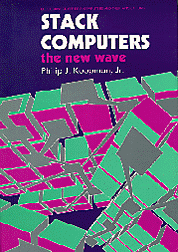Skip to comments.
Eric LaForest: Next Generation Stack Computing [stack vs register-based CPUs]
Digg.com ^
| 8/8/2006
| Eric LaForest
Posted on 08/10/2006 3:19:46 PM PDT by TChris
Eric LaForest delivers a crash-course on modern stack computing, the Forth programming language, and some projects of his own. Stack systems have faster procedure calls and reduced complexity (shorter pipeline, simpler compilation) relative to their conventional counterparts, as well as more consistent performance, which is very important for real-time systems. Many consider stack-based architecture's crowning feature, however, to be the unrivalled price-to-performance ratio.
TOPICS: Computers/Internet; History; Science
KEYWORDS: cpu; processor; register; stack
Very interesting stuff. Seems they would be a very powerful machines, these stack thingies.
(Videos in many formats available at link)
1
posted on
08/10/2006 3:19:47 PM PDT
by
TChris
To: TChris
New stack computing??? I'm just getting used to RPN!
2
posted on
08/10/2006 3:23:08 PM PDT
by
llevrok
(When you take my gin from my cold, dead hand....)
To: TChris
>Eric LaForest delivers a crash-course on modern stack computing
Very cool thread! Thanks!
My favorite thread of the week.
Have an Anna pic!

To: llevrok
New stack computing??? I'm just getting used to RPN! Ah yes... I used to have an HP 15C. Those were the days.
4
posted on
08/10/2006 3:24:18 PM PDT
by
TChris
(Banning DDT wasn't about birds. It was about power.)
To: llevrok
You're in luck - RPN is very closely related to the concept of a stack!
To: theFIRMbss
My favorite thread of the week.
Have an Anna pic! Really? Umm... OK. Anna's cute. *shrug*
6
posted on
08/10/2006 3:25:29 PM PDT
by
TChris
(Banning DDT wasn't about birds. It was about power.)
To: theFIRMbss
Don't forget Maria Sharapova...
7
posted on
08/10/2006 3:29:12 PM PDT
by
Army Air Corps
(Four fried chickens and a coke)
To: TChris
Ah yes... I used to have an HP 15C. Those were the days. I had a HP 25, the memory got me thru calculus in college. God what long time ago that was.
8
posted on
08/10/2006 3:37:21 PM PDT
by
fedupjohn
(If we try to fight the war on terror with eyes shut + ears packed with wax, innocent people will die)
To: TChris
>Really? Umm...
 |
Well, now that I've read
the thirty slides, there isn't
too much new stuff there.
In fact, there's more meat
in this old '89 [!] book.
Stacks are interesting.
|
To: theFIRMbss
In fact, there's more meat in this old '89 [!] book. Stacks are interesting. OK, I want AMD to start working on the K10s architecture, with 64-bit stacks (at 6+ GHz) for everyone!
10
posted on
08/10/2006 3:39:29 PM PDT
by
TChris
(Banning DDT wasn't about birds. It was about power.)
To: TChris
It's an interesting concept. I remember mainframes that had registers and no stack. But I think we'll continue to use architectures with both features for the foreseeable future. Stacks frames are great for passing arguments and containing local variables in structured programs, but good usage of registers can make a program fly.
11
posted on
08/10/2006 3:53:44 PM PDT
by
HAL9000
(Happy 10th Anniversary FreeRepublic.com - Est. Sept. 23, 1996 - Thanks Jim!)
To: Ernest_at_the_Beach; FairOpinion
I loved foolin' with the stack on the good old Apple II.
12
posted on
08/10/2006 7:58:44 PM PDT
by
SunkenCiv
(updated my FR profile on Thursday, August 10, 2006. https://secure.freerepublic.com/donate/)
To: HAL9000
God ..you're gonna make us old Freeper's post about this, aren't yea....
Give us a break.!!!!
13
posted on
08/10/2006 9:18:03 PM PDT
by
fedupjohn
(If we try to fight the war on terror with eyes shut + ears packed with wax, innocent people will die)
To: fedupjohn
Of course, you are aware that Gene Amdahl's decision to omit a stack from the IBM System/360 was a conspiracy to drive up software and maintenance costs.
14
posted on
08/10/2006 10:34:45 PM PDT
by
HAL9000
(Happy 10th Anniversary FreeRepublic.com - Est. Sept. 23, 1996 - Thanks Jim!)
To: HAL9000
It's an interesting concept. I remember mainframes that had registers and no stack. But I think we'll continue to use architectures with both features for the foreseeable future. Stacks frames are great for passing arguments and containing local variables in structured programs, but good usage of registers can make a program fly. AFAIK, Curren't processors don't have a hardware stack. They just have registers. A "stack frame" is only a memory construct, not a hardware feature.
15
posted on
08/11/2006 7:21:21 AM PDT
by
TChris
(Banning DDT wasn't about birds. It was about power.)
To: TChris
You're probably right. I only browsed the slides, and missed the full explanation of the stack hardware.
The presentation seemed to be based on the assumption that the registers would be used exclusively in read/modify/write cycles. I guess that's especially true for x86 processors with relatively small number of registers. But in processors with a large register set, a good compiler or assembly language program can optimize the code to minimize reads/writes to external memory.
16
posted on
08/11/2006 9:44:51 AM PDT
by
HAL9000
(Happy 10th Anniversary FreeRepublic.com - Est. Sept. 23, 1996 - Thanks Jim!)
Disclaimer:
Opinions posted on Free Republic are those of the individual
posters and do not necessarily represent the opinion of Free Republic or its
management. All materials posted herein are protected by copyright law and the
exemption for fair use of copyrighted works.
FreeRepublic.com is powered by software copyright 2000-2008 John Robinson


